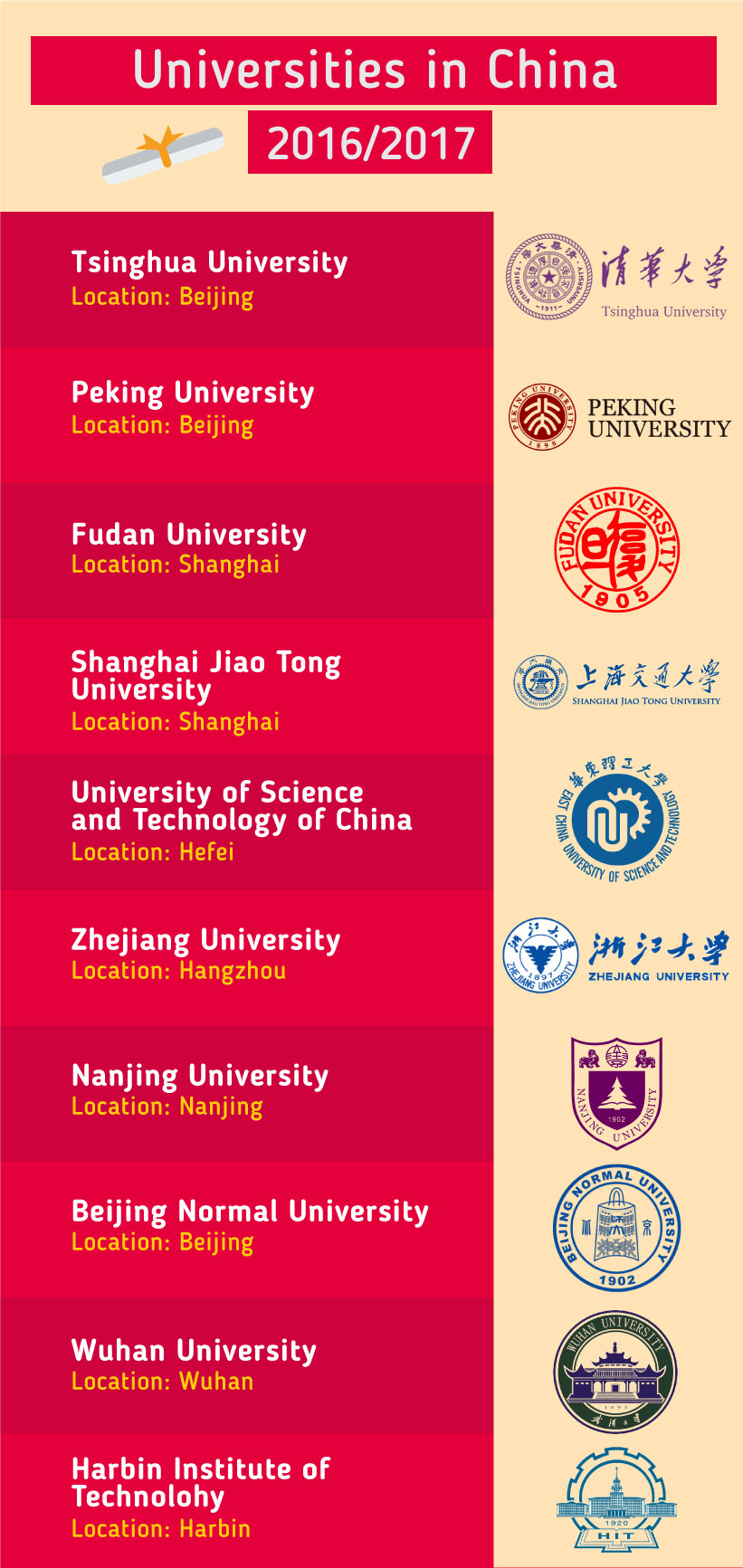Study in China
The world’s second biggest economy and an emerging student destination
China is fast becoming a major competitor in the world, for its industries, economy and higher education. The country, too, can be a cheap alternative to a world-class higher education as compared to countries such as the United States, Australia among others. Read our guide below to find out if studying in China is for you.

A Quick Intro to China

The figure 1.3 billion might be overwhelming for you in terms of a country’s population, but not for the fastest growing economy in the world – which China has been the last few decades. From sophisticated urban cities to rural cities close to nature, you will be spoiled by these beautiful landscapes of hills, lakes, and wide-open fields. Chinese culture too is, essentially, fascinating to immerse oneself in – which would automatically be part of your student life if you choose to study in China.
Why Study in China?

There are different reasons why you should study in China. It is a great chance to study in the most populous country in the world. You will experience a mix of ancient and modern civilisation within a country that has many different cultures and dialects. As China exudes both tradition and modernity, its rich history extending further than 5,000 years, its seven UNESCO world heritage sites such as the Forbidden City, and its booming cities, like Shanghai, are some of the reasons why you should go.
As the second largest economy in the world, just one step down from the United States, only would working there be immensely rewarding, but studying in China would be so as well. That is why many students worldwide choose to study in China for a chance to meet people from all over the world and expand their network! Companies and leaders from various industries come to this part of the country and do their business in China, so it’s possible to meet one or them while you are in the country.
Also, China is very affordable; the cost of living and the tuition fees are much lower on an average, compared to other continents. Plus, the Chinese government is investing immensely in education to get more international recognition. Thus, you will get a chance to get the top education at a price you can afford.
Higher Education in China
China has an over 2,000 higher education institutions all over the country, and some of Asia’s and the world’s top universities belong to China, such as Tsinghua University and Peking University in Beijing. While the country is known to be the top country sending students to study overseas, it is also a known fact that the country has been wooing international students to come and study in the country. According to the Ministry of Education of China, in 2014, there were 377,054 international students in the country, and this is growing year by year.
The Chinese government plays a vital role in improving the education sector in the country. Over the years, it has been very active and encouraging in the development of the country’s higher education standing, both in quantity and quality. With this mission, the government has poured large amounts of funding to certain universities to help improve facilities, build research centres, attract world-renowned scholars and faculties, among other developments.
A. Higher Education Institutions in China
The universities in China are either state-owned or non-government (private) institution:
| Regular Institutions | Independent Institutions | Vocational Institutions | Adult Institutions |
|---|---|---|---|
| Institutions run by the central ministries and agencies, as well as local authorities. These “traditional” and “typical” HEIs help students prepare for examinations for a recognised degree under the government, as well as training to improve their skills that are beneficial to the Chinese economy | Also known as duli xueyuan These institutions do not receive any government funding; they work with other well-known universities, private institutions, and the business sector – self-funding, their tuition fee is more expensive | Offer all levels of degrees (Bachelor, Master and PhD), but use both the theoretical framework and practical skills (applied science) during studies. | Includes the institutions focusing on: Administrative Colleges: adult middle school and higher education programmes for government officers Correspondence Departments and Attached Evening Colleges: part-time adult higher education programmes through correspondence and attached evening colleges Employees’ Colleges: offers credentials to staff/ or workers Independent Self-Study Examinations: the only form of higher education in China with an entirely open admissions policy Radio and Television Universities: multimedia courses through radio, television, print, audio-visual materials and computer networks on a nationwide basis Spare-time Universities: sub-degree level programmes undertaken in the students’ spare time Source |
Private Higher Education Institutions
- These institutions are not administered by local, state, or national government; source of income depends on students
- While more expensive than public schools, students can get scholarship from these institutions
- There are currently 300 private HEIs in Chin
Government Initiatives
Key projects have also been initiated by the Chinese government to raise the colleges and universities to world-class standards. In the mid-1990s, the central government launched these two programmes – investing billions of dollars – to improve the quality and make the Chinese higher education competitive worldwide.
- Project 211: Together with the State Council and the Department of Finance, the Ministry of Education of China co-issued this in 1995, aiming to strengthen the selected HEI and key disciplines. See here the current universities in China which are part of this group.
Did you know? The number 211 comes from the project’s slogan – For the 21st century, to manage 100 universities successfully (面向21世纪,办好100所高校) with 100 as the estimated number of participating universities.
- Project 985: Launched in 1998 by the State Council and the Ministry of Education of China, this project aims to build world-class universities in China. There were 39 universities from Project 211 that received additional funding (USD40.4 billion or CNY264.9 billion) from the central government, on top of the budget (USD28.4 billion or CNY186.3 billion) from the local government to improve their research centres, facilities, hold international conferences, attract world-renowned faculty and staff, and assist Chinese faculty to attend conferences overseas.
- Also, the Project 985 has produced the C9 League – the Chinese version of the US Ivy League. With these projects in place, the number of colleges and universities have doubled in the last decade, some of which have ranked as the best in the world for science and math.
Universities in China included in Project 985 are (in bold are the C9 schools):
- Peking University
- Tsinghua University
- Fudan University
- Harbin Institute of Technology
- Nanjing University
- Shanghai Jiao Tong University
- University of Science and Technology of China
- Xi’an Jiaotong University
- Zhejiang University
- Beijing Institute of Technology
- Beijing Normal University
- Beihang University
- Central South University
- Minzu University of China
- Renmin University of China
- China Agricultural University
- Chongqing University
- Dalian University of Technology
- East China Normal University
- Huazhong University of Science and Technology
- Hunan University
- Jilin University
- Lanzhou University
- Nankai University
- Northwestern Polytechnical University
- Northeastern University
- Northwest A&F University
- Ocean University of China
- Southeast University
- Shandong University
- Sichuan University
- South China University of Technology
- Sun Yat-sen University
- Tianjin University
- Tongji University
- University of Electronic Science and Technology of China
- Wuhan University
- Xiamen University
- National University of Defense Technology
Did you know? The name Project 985 was derived from the date when this project was announced (May 1998 – 98/5)
B. Pathway to Studying in China
The length of your study depends on the path you wish to take. Here’s a basic duration of study in China

C. Top Institutions in China
Several universities in China are present in the rankings of top 300 universities in the world, and in particular, these universities rank highly in Asia and BRIC’s top rankings as well. The top 20 universities in China are as follows:

D. After Study Opportunities in the China
When you decide to stay longer in the country because you want to continue your study, you can go to the embassy and apply for an extension of your study visa. Most of the time it will not be a problem, as long as you have a university declaration as proof.
But if you want to stay longer because you got a job offered, different rules apply. In this case, you need to apply for a work visa called Visa Z, and both the employer and you need to meet the conditions. Check out the official Chinese government website for more information and the requirements for applying for a work visa, or any other visa that is not a student visa.
Applying to Study in China

A. Language Requirements
Many courses in China are taught in Mandarin instead of English–hence, if you are planning on pursuing a course in Mandarin, you are required to present a certificate of a passing grade in the Hanyu Shuiping Kaoshi (HSK) exam, between levels 3 to 8. This certificate is usually obtained through a one to two-year intensive course learning Mandarin. This would enable you not only to understand lectures but also communicate with the Chinese population in general for your comfort and convenience.
However, as most students would usually choose, if you plan on pursuing your degree in the English language you may not be required to learn Mandarin, although you may be asked to take and show proof of having passed an English language test, usually the IELTS or TOEFL. But this differs per university; some are more flexible than others with regards to English sufficiency.
B. Visa Requirements
For China, once students receive their offer letter from the university of choice, a decision must be made of the type of visa the student is required to apply for. Student visas in China are divided into two: X1 and X2. X1 is for students who are planning on studying in China for more than six months, while X2 is for those who will be studying in the country for less than six months.
After that, students must go to the China consulate or embassy in their country to apply for the visa, along with the following documents:
- Acceptance letter from University
- Visa application form (JW201 or JW202)
- Physical Examination Record
- Original passport
- One recent passport sized photograph
After application and approval of your visa, you may leave for your studies in China. Once arrived, international students are required to pay a visit to the Health quarantine bureau to confirm their Physical Examination Record. If a student is found to have failed it, they would be asked to go through it again in China.
Tuition Fees
For a quality education, China’s tuition fees are remarkably low, making the country excessively affordable for those seeking a good abroad education. While annual tuition fees can amount to USD 15,000 in several countries around the world, in China students can obtain a degree from a top 50 university paying a small annual fee of USD 1,500.
| Study Level | Tuition Fee, Per Year, in CNY | Tuition Fee, Per Year, in USD |
|---|---|---|
| Bachelor’s Degree | Between 13,500 – 28,000 | 2,000 – 5,000 |
| Master’s Degree | Between 21,000 – 35,000 | 3,000 – 5,500 |
| Doctorate’s Degree | Between 21,000 – 35,000 | 3,000 – 5,500 |
Universities in China Grouped by Subject




More about studying in China, below:
- Cost of living in China
- Work opportunities in China
- Who studies in China?
- Lifestyle in China
- Economic outlay of China
- Interview with EasyUni’s Lily about student life in China
- 4 reasons why studying China can boost your career
